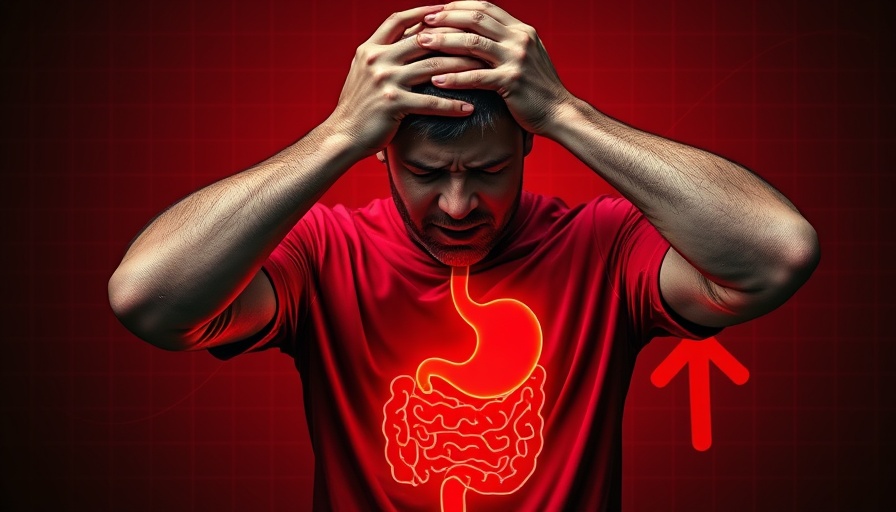
Understanding the True Nature of Depression
Many people have been led to believe that depression stems from a chemical imbalance in the brain, primarily linked to serotonin levels. However, new insights reveal a different story: the gut plays a fundamental role in our mental health. In fact, the gut-brain connection is proving to be much more intricate and important than previously understood. This connection is made primarily through the vagus nerve, which serves as a critical communication pathway between the gut and the brain.
In 'Depression Has NOTHING to Do With Your Brain,' the discussion dives into the gut's role in mental health, exploring key insights that sparked deeper analysis on our end.
Why the Chemical Imbalance Theory is Being Challenged
Historically, the treatment of depression has hinged on the chemical imbalance theory, leading to widespread prescriptions of SSRIs (selective serotonin reuptake inhibitors). Yet, studies suggest that many individuals affected by depression exhibit normal or even high levels of serotonin. This disconnect raises serious questions about the efficacy of SSRIs, especially considering the unpleasant side effects that accompany their use. Some experts like Dr. Peter Goch argue that SSRIs might function more like placebos, prompting us to reconsider alternative treatments.
Revisiting Natural Remedies: Could St. John’s Wort Be the Answer?
Instead of relying solely on synthetic medications, natural remedies such as St. John’s Wort have gained attention due to their perceived lower side effects and multi-faceted mechanisms of action. Not only does this herb influence serotonin levels, but it also impacts dopamine—making it an appealing alternative for those dealing with depression. Compared to traditional medications, St. John’s Wort presents less risk of sexual dysfunction and emotional numbness, which are common complaints among SSRI users.
The Crucial Role of Gut Health
Your gut is more than just a digestive organ; it’s a vital player in your mental well-being. The gut is responsible for producing significant amounts of serotonin and oxytocin, both of which have profound effects on mood and emotional health. An imbalance in gut microbes or inflammation can severely impact mental health, leading to feelings of depression. This highlights the pressing need to consider gut health as an integral component of mental wellness.
Understanding the Impact of Antibiotics on Mood
It's worth noting that antibiotics can negatively impact gut health, clearing out beneficial bacteria crucial for mood stability. Many individuals report depressive symptoms after antibiotic treatments, leading to the understanding that replenishing gut bacteria can be essential for recovery. Therefore, encouraging a balanced gut flora can be one way to alleviate forms of depression.
Probiotic Power: The Benefits of Elutery
Among the newer insights in gut health is the role of specific probiotics, like Elutery, which can greatly enhance mood and well-being. With reports of increased sociability and improved sleep when consuming this probiotic, it could just be the key to restoring mental health without severe side effects. The cultivation of these microbes, as some suggest, may harness the body’s natural capabilities to rejuvenate mental health.
Practical Steps for a Healthier Gut and Mind
To truly harness the gut-brain connection, it's crucial to incorporate strategies that support gut health. Eating a balanced diet rich in fiber, whole grains, and fermented foods can go a long way. Probiotics from natural sources can help cultivate a healthier gut microbiome, promoting better mental wellness. Simple lifestyle changes can yield significant rewards, proving the adage that health is indeed wealth.
Reflecting on the Journey Towards Mental Wellness
The insights derived from the conversation around depression’s true origins underscore the importance of rethinking our approach to mental well-being. It’s important for everyone, especially those aged 50 and over, to consider these alternative perspectives on mental health. Soon, it may be common practice to manage depression not just from the brain's viewpoint but also from the gut's compelling narrative.
If you're interested in how the gut-brain connection can shift your perspective on mental health, I encourage you to explore more ways to nurture your gut. After all, understanding that your gut might be the root of your mood changes could be the game-changer you need on your journey to better health.
 Add Element
Add Element  Add Row
Add Row 




Write A Comment